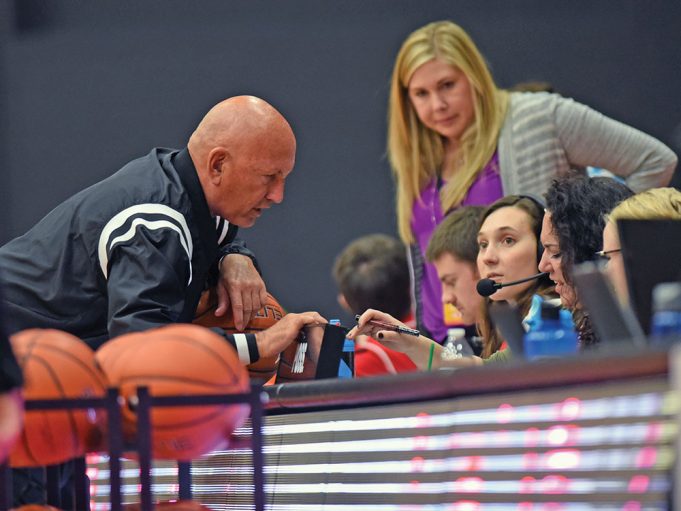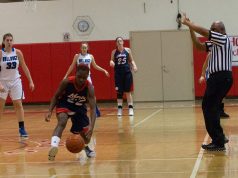Editor’s note: This article specifically mentions high school examples. NCAA M/W require two scorers, unless one is acceptable to the referee (2-1.1.b).
I have been telling the people who have worked for me for years that I do not pay them to solve problems; I pay them to prevent them. A problem is inevitably some combination of mess, loss and embarrassment — all things better done without, no matter how elegant the solution. The same thinking applies to officiating, where the wise official misses no opportunity to call upon whatever resources can make things run more smoothly.
In a high school game, one such resource is the visiting scorer. Officially, this person — who usually doubles as the bus driver, or a beloved hanger-on — has no status in the contest. In fact, if the visiting scorer becomes a nuisance, he or she can be asked to sit elsewhere. Having said this, the visiting book (or neutral scorer) can be a tremendous help, never miss a chance to insinuate this person into the mix during a game. Usually, the visiting scorer submits him or herself as a humble servant who has a sincere interest in doing an honest night’s work. If done properly, a positive relationship can be created between the official and visiting scorer which can come in handy as needed.
Establish the visiting scorer as a respectful monitor of the process
You want to establish the visiting scorer as a respectful monitor of the process who is encouraged to speak up if something is amiss; done properly, the visiting scorer can often head off problems by establishing a pattern with the scorer in the striped shirt as the game goes along. This way, any errors are likely to be caught and fixed before they become contentious or untraceable. Most importantly, they can be fixed before the crew needs to get involved.
Make it a point to draw in the two scorers when you enter the floor. Prior to the captain’s meeting, go the table and engage them both in the same conversation. If they seem comfortable with one another, you are headed in the right direction. If they are already showing pictures of each other’s grandchildren, so much the better. If possible, have them sit on the same side of the timer and, ideally, the announcer is seated between them, so everyone’s hearing the same story. When checking the book at least 10 minutes prior to the tipoff, it is best to take the official book over in front of the visiting scorer and have him or her double check the numbers and starters of each team as you read them out. Once you agree (twice a season, or so, you will not initially) then put your initials in the first blank space on both sides of each book, telling them that any names below your initials will be a technical foul. Finally, ask them to let you know at the first opportunity if they have a disagreement. By doing this, you plant in their minds that the official scorer is boss, but they are both important and can help everyone by working together.
As the game goes on, make it a point to drop in on the table once or twice. Ask if the two are still talking to one another, and they usually are. What you want to know, as it comes down to the wire, is if they agree on the score, the foul count of each team, the number and flavor of remaining timeouts and the direction of the possession arrow. Usually, both scorers keep enough timing notes and other doodles that they can reconstruct if a foul is missing or on the wrong person. If your crew has been paying attention, neither scorer can tell you anything truly surprising anyway. If they do, however, and the two just cannot agree on a resolution, you might not automatically go with the official scorer’s word: If your crew or you know something to be different, instruct the official scorer to correct the book. In this context, the visiting scorer can be a source of the supporting “information.” Only as a last resort, when both the crew and the table have already failed, would you go with what is in the official book.
Nine hundred and ninety-seven out of a thousand scorer pairs are perfectly happy with this arrangement. If the other three really want to make life miserable for one another and our crew, make sure your partners know there is trouble at the mill, so all can keep an extra eye on those with the poopy diapers. It may be worthwhile to also let the state office know; maybe they can talk some sense into them.
The bottom line is that the referee and the table must maintain an effective working relationship with one another, and the visiting scorer (or neutral scorer) can help. It is not a master-and-slave relationship, but more like one where you live across the street from the building inspector: Trust — but not too far — and respect each other’s interests.
Use the second book to your advantage to make for an easier game.
What's Your Call? Leave a Comment:
Note: This article is archival in nature. Rules, interpretations, mechanics, philosophies and other information may or may not be correct for the current year.
This article is the copyright of ©Referee Enterprises, Inc., and may not be republished in whole or in part online, in print or in any capacity without expressed written permission from Referee. The article is made available for educational use by individuals.


















